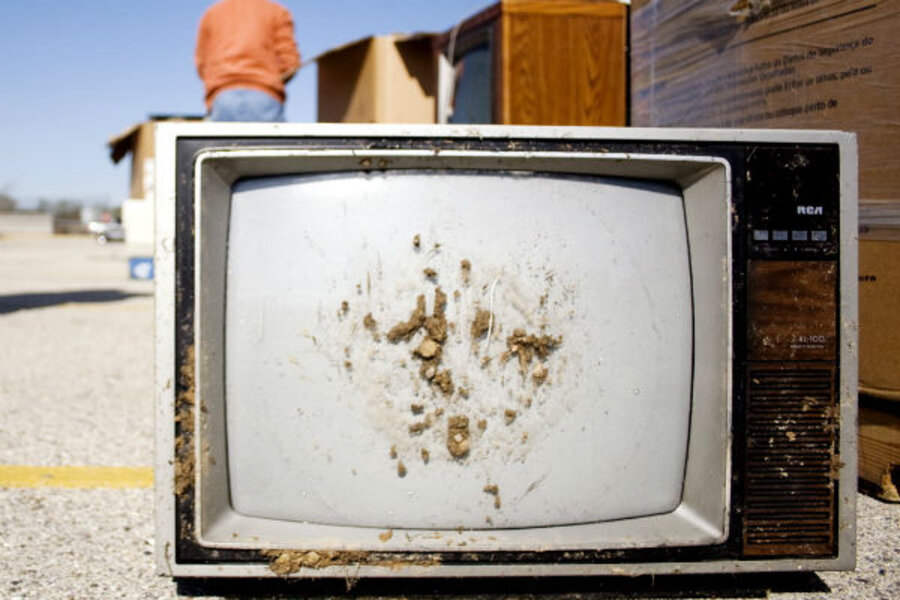Screen-Free Week: Parents this includes you, and your iPads, too
Loading...
Hi Parents! Today marks the second day of “Screen-Free Week,” an annual event where child development experts and advocates encourage you to turn off the television, stash away the iPad, hide the Baby Einstein CDs and generally keep your little ones away from electronic interaction.
I’m a big fan of this. Which is rich, really, since you’re probably reading this on, well, a screen.
And because sometimes, just to get these articles written, I will toss "Baby M" my iPhone (which she loves loves loves) so that she becomes engrossed in scrolling and tapping and just stops trying to switch off my computer, which is a new trick of hers, and one that says something, really, about that whole working-at-home thing.
She even posted something on Facebook the other day – a smattering of letters, which conveniently looked like a swear word – while I was doing an interview. An interview about the dangers of early electronic media exposure. Totally busted. Official Bad Mommy.
Anyhow, this is all to say I love screen-free week. I love it even though I know that for a lot of families, it’s really hard to follow.
Screens are just everywhere. The Kaiser Family Foundation reports that one in three children under 3 have a television in their bedrooms, and that about two thirds of children aged 8 to 18 report having the television on during meals. (Forty-five percent say the television is on “most of the time” in their home, even if nobody is watching.)
But televisions are just part of it. We don’t even have a television here – yes, we’re one of those families – and the screens are still constantly a-blazing. There are computers, phones, music devices, e-readers. And we’re not alone. Mobile media use has skyrocketed among kids (in 2010 Kaiser reported that 66 percent of young people had cell phones, and 76 had iPods and other MP3 players), helping drive screen time to a whopping average 7 hours and 38 minutes a day among children 8 to 18, according to Kaiser. (And much of that time is “media multitasking.”)
The lives of even younger children are becoming just as screen-centric. The market is exploding for mobile apps and “educational” computer games targeted at the preschool set. According to Common Sense Media, a nonprofit group focused on kids and media, almost three quarters of the top-selling apps in the iTunes store are for preschool or elementary aged children. Those for toddlers and preschoolers are the most popular category.
Add this to the DVD players built into minivans and the baby laptops playing videos promising to turn your kid into a genius, and, well, you’ve got a lot of what people call “screen time” going on.
The problem, according to the American Academy of Pediatrics (AAP), is that there is no proof that any of these “educational” apps or videos are actually developmentally helpful. And there’s some evidence that they hurt kids.Two studies have found that watching a program such as “Sesame Street” (and I adore Sesame Street, particularly Oscar) has a negative effect on language for children younger than two years.
So the AAP discourages media use in children under 2 years old, noting the lack of evidence supporting educational or developmental benefits, as well as the potential adverse health and developmental impacts. They also say that children develop at different speeds, so it’s hard to make blanket recommendations for this group.
But there's another aspect of screen time for kids: the adverse effects of parental media use on children under two years. This, AAP points out, is also a big problem.
Looking around sheepishly here.
Because it’s one thing to ban flashing lights and televisions and video games for my young toddler. It’s another to actually change my own behavior. To put away the iPhone. To fully acknowledge that despite my months of writing about this topic – of knowing this is a problem – my kid is more comfortable scrolling through my photo gallery than stacking blocks.
This is one of the reasons that groups ranging from the play organization KaBOOM! to the National WIC Association to the National Black Child Development Institute see Screen-Free Week as a family affair - an “annual celebration where children, families, schools and communities turn off screens and turn on life.”
I know we can’t really do a 100 percent screen free week here at my house. I’d lose my job. But we can do way, way better.
And so, probably, can you. Although we’ll let you make an exception for Modern Parenthood.
Happy Screen Free, everyone.








